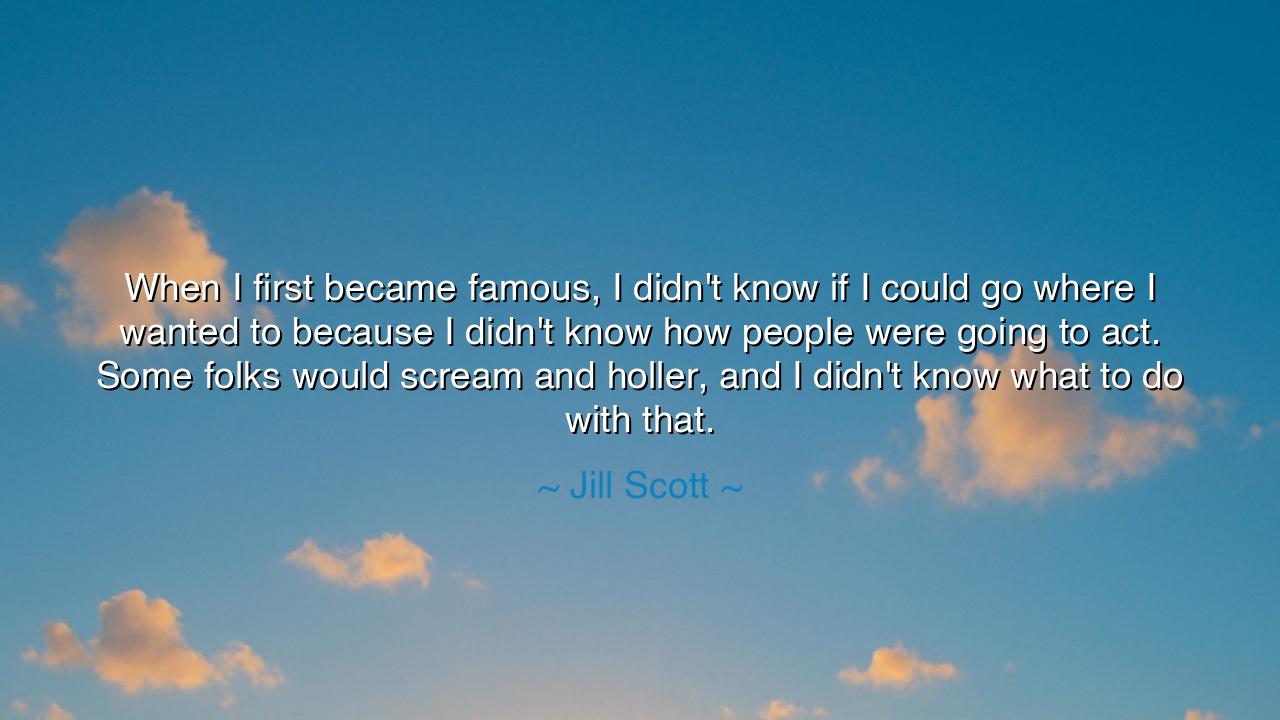
When I first became famous, I didn't know if I could go where I
When I first became famous, I didn't know if I could go where I wanted to because I didn't know how people were going to act. Some folks would scream and holler, and I didn't know what to do with that.






Host: The soft glow of the evening light filled the room, creating a quiet space for thought. Jack sat at the table, his fingers lightly resting on his cup, reflecting on Jill Scott’s words. Jeeny stood near the window, her gaze directed outward, considering the deeper meaning of the statement.
Jeeny: “I’ve been thinking about what Jill Scott said: ‘When I first became famous, I didn’t know if I could go where I wanted to because I didn’t know how people were going to act. Some folks would scream and holler, and I didn’t know what to do with that.’ It’s such a real reflection on the shock of fame, isn’t it? The idea that fame can create this disconnect between how you experience the world and how others perceive you. The attention, the reactions, can feel overwhelming and even unnerving at first.”
Jack: “Yes, exactly. Scott is giving us a glimpse into the disorienting reality of fame. Before you’re famous, you can move through the world in a certain way—without much attention or fanfare. But once you become a public figure, everything changes. People begin to react to you, not as an individual, but as an image, an icon. And it’s jarring when those reactions don’t match your expectations or the reality of who you are.”
Jeeny: “Right. It’s like fame creates this separation—you want to go places, do things, but now you're not sure if you can because you’re no longer just yourself in those spaces. You’re someone who is being watched, idolized, or even judged. And for Scott, the unpredictability of people’s reactions—screaming, hollering—was a new reality she had to adjust to. It’s not just about the attention, but about not knowing how to navigate it.”
Host: The stillness in the room deepened as they both reflected on how fame changes the way we move through the world. Jack’s fingers rested on the table, while Jeeny’s expression softened, considering how fame creates a new relationship between individuals and society.
Jack: “It makes me think about how fame really distorts the way people relate to each other. For someone like Scott, who just wanted to go places and experience life, the reactions of strangers became unpredictable. Fame changes that dynamic—it’s no longer just about personal experience, but about how others perceive you. Scott didn’t just want to be famous, she wanted to live freely, and suddenly, her freedom was bound by how people would react to her presence.”
Jeeny: “Exactly. And Scott’s words show us the vulnerability that comes with fame—the sense of loss of control. When you’re famous, your personal space and your personal moments become public, and you no longer get to experience them the same way. You become aware of how others project their expectations and emotions onto you, and you can feel disconnected from who you really are.”
Jack: “And that’s where the emotional complexity of fame comes in. You want to maintain your sense of self, but you have to figure out how to balance that with the reality of how others see you. The pressure to meet expectations, to live up to the image people have of you, can be a lot to carry. And that uncertainty—whether it’s about how people will react or how to manage those reactions—is something people don’t often talk about.”
Jeeny: “Exactly. Scott is showing us that fame isn’t just about the privileges or the luxuries. It’s also about navigating the challenges that come with it, especially the emotional toll of always being in the public eye. You have to adjust to this new way of being seen, and sometimes that’s not easy. It’s about learning to deal with the overwhelming nature of fame, without losing yourself in it.”
Host: The quiet in the room grew deeper, as they reflected on the vulnerability that comes with fame. Jill Scott had shown them that fame is not just about the accolades or recognition—it’s about adjusting to a world where your presence is constantly felt, and often, it’s not in the way you expect. Jack leaned back slightly in his chair, while Jeeny’s gaze turned from the window back to him, both of them understanding the complexity of fame and its emotional impact.
Jack: “So, Scott is really showing us that fame comes with its own set of challenges—it’s not just about the external attention, it’s about how that attention affects your personal life and your ability to move freely through the world. The unpredictability of how people will react to you can be overwhelming.”
Jeeny: “Exactly. Fame isn’t just about being celebrated—it’s about managing the emotional weight of that celebration. Scott is reminding us that even when people want to meet their idols, the process of being an idol can feel isolating and sometimes difficult. The emotional complexity of fame is often overlooked, but it’s one of the most significant parts of what it means to be famous.”
Host: The evening had fully settled in, the quiet understanding between them a reminder that fame comes with both external rewards and internal struggles. Jill Scott had shown them that fame creates a new relationship between oneself and the world, one that requires constant adjustment. The world outside had darkened, but inside, there was light—a recognition that while fame may bring external success, it also demands emotional resilience and the ability to navigate the unpredictability of public attention.






AAdministratorAdministrator
Welcome, honored guests. Please leave a comment, we will respond soon